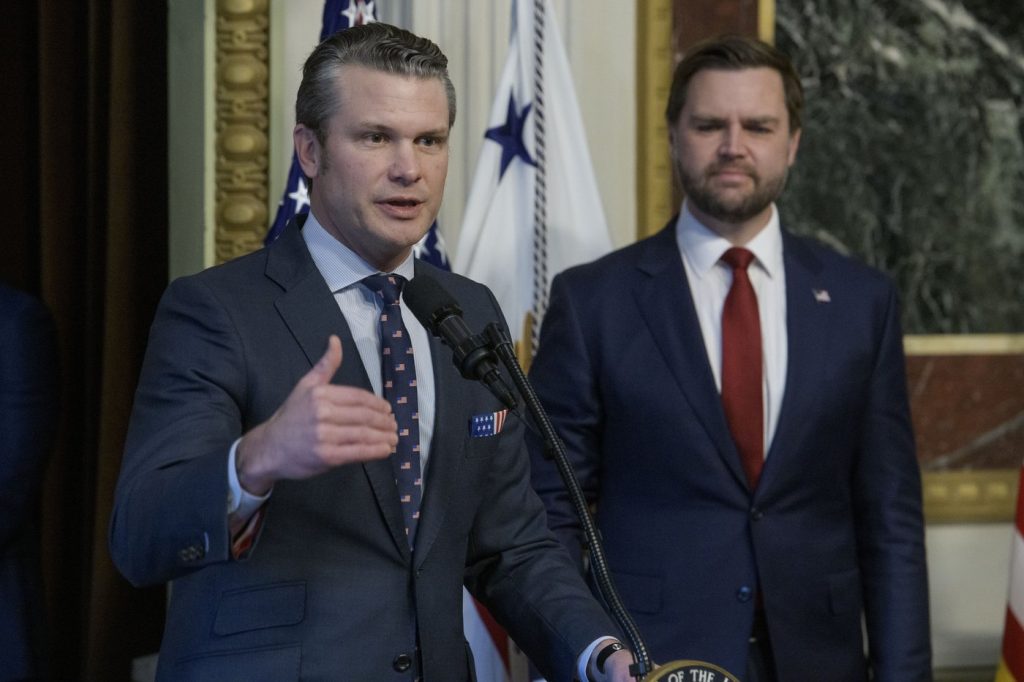WASHINGTON (AP) Defense Secretary Pete Hegseth's first official day on Monday presents him with numerous significant challenges, ranging from global conflicts to domestic concerns, particularly border security. A central priority for Hegseth will be addressing President Donald Trump's directive to strengthen the U.S. military presence along the southern border, as well as evaluating the potential role of active-duty troops in law enforcement, a seldom-used measure.
Hegseth's agenda includes an array of other pressing issues, such as the Pentagon's substantial budget, the status of aid to Ukraine amidst ongoing war efforts, the handling of the ceasefire in Gaza, and troop deployments in the Middle East. Additionally, he faces directives from Trump to eliminate diversity and inclusion programs within the federal government and cut unnecessary expenditures while removing supporters of the Biden administration.
In a message to military personnel after his swearing-in ceremony, Hegseth acknowledged the challenges ahead, some of which have persisted through his predecessors, including the need to shift military focus away from years of engaging in the Middle East and effectively countering China's influence. This transition has been complicated by ongoing conflicts, such as the October 2023 attack on Israel by Hamas.
Hegseth's priorities also encompass strengthening the defense industrial base and achieving a successful Pentagon audit, all while maintaining U.S. military dominance globally. Shortly after taking office, he visited the Pentagon, with no media present, indicating his commitment to swiftly grasping the intricacies of the military structure, which comprises 2.1 million service members and 780,000 civilians, including many stationed in combat zones overseas.
Among the immediate objectives Hegseth will face are border deployments. He will need to assess troop availability, coordinate logistical support for Border Patrol operations, and ensure that these efforts do not compromise national security requirements. A key decision will involve whether to advise the deployment of active-duty troops in law enforcement roles, a sensitive issue given the constraints imposed by the Posse Comitatus Act and recent executive orders from Trump calling for reports on the potential invocation of the Insurrection Act to authorize such actions during emergencies.
Another prominent issue involves the status of transgender troops. Hegseth must navigate the remnants of legal battles stemming from Trump’s previous ban on transgender service members. As he revokes protections reinstated by the Biden administration, the legal ramifications may resurface, particularly as the Defense Department lacks accurate data on the number of transgender individuals serving in the military.
The defense budget is another critical area for Hegseth to familiarize himself with, as the Pentagon currently operates with a budget of approximately $850 billion. Trump's insistence on enhancing military capabilities while simultaneously cutting waste will require careful fiscal planning. Included in these discussions will be the security assistance destined for Ukraine, where Trump and Hegseth will need to decide on the future of previously authorized military aid amidst broader cuts to foreign assistance.
Hegseth is also tasked with executing Trump's mandate to dismantle diversity, equity, and inclusion (DEI) programs within the Defense Department. His Senate confirmation hearing underscored his commitment to eliminating what he perceives as "wokeness" that detracts from military effectiveness. Although there are currently no full-time employees focused on DEI, the push to rid the military of these initiatives has led to confusion and inconsistency at various levels, particularly regarding the removal of online materials related to diversity.
Lastly, Hegseth will have to address how the military deals with reproductive care following the Supreme Court's decision to overturn Roe v. Wade. The previous policy allowing service members to receive financial support for reproductive healthcare travel is now under scrutiny. It remains unclear if Hegseth will modify or eliminate this reimbursement provision, which, despite limited usage, represents a significant aspect of service member healthcare policy.










